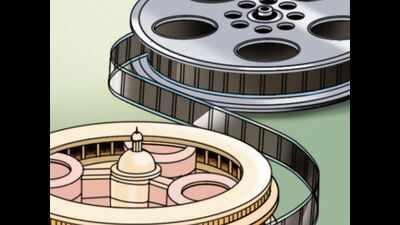- News
- City News
- mumbai News
- When boundaries between actors and politicians hadn't blurred
Trending
This story is from September 20, 2020
When boundaries between actors and politicians hadn't blurred
The Sushant Singh Rajput case has triggered a high-decibel debate on, among other issues, the tumultuous ties between politics and cinema.

In contrast, old-timers recall the days in the soft afterglow of the freedom struggle when actors and politicians co-existed harmoniously while maintaining a dignified distance from one another
Politicians didn't go beyond the ceremonious presence at special screenings of films once in a while.

For Nehru, though, Hindi cinema remained a distant land. During one of his visits to Mumbai, he agreed to meet a delegation of film producers and actors. Everyone present on the Raj Bhavan lawns were in for a shock when he declared with a wave of hand, "Come on, introduce yourselves." The select gathering included several top-heavy stars of the time. Thespian Motilal, it is said, was too embarassed to utter his name, which he shared with the Prime Minister's father, Motilal Nehru.
In 1962, the film industry leaders tried again for a brief meeting with Nehru in New Delhi, this time with an agenda: Concession on the raw stock tax. He refused to meet the delegates, even after Satyajit Ray put in a word. Instead, Nehru told them to hold talks with Morarji Desai, who then held the finance portfolio in the Union cabinet.
Vallabhbhai Patel would often send a word, through his emissary filmmaker Chandulal Shah, to cinema czars to help the Congress party raise funds for a national cause. "And money began to pour in like the Mumbai rains," said cinema scholar Virchand Dharamsey. "But politicians, of whichever hue, never relied on glamour to win an election," he added.
Lal Bahadur Shastri, it is said, was moved to tears when he saw 'Shaheed', actor-producer Manoj Kumar's bio-pic on Bhagat Singh. Kumar once told an interviewer, "He asked me if I could translate on celluloid his famous 'Jai Jawan, Jai Kisan' slogan, which had then taken the nation by storm amidst the 1965 India-Pakistan war."
Atal Behari Vajpayee was a film connoisseur too. A Mumbai BJP MLA recalled how Vajpayee expressed his wish to see 'Suraj Kaa Saatwaan Ghoda', a 1992 Shyam Benegal film based on Dharmavir Bharati's epic novel of the same name. "But he kept away from film people."
Congress politicians from Maharashtra, said observers, generally shunned cinema, choosing rustic forms of entertainment: Tamasha, wrestling and elections to sugar cooperative mills. Balasaheb Thackeray, though, had a soft spot for filmdom and many stars would turn up at Shanmukhananda auditorium for Shiv Sena's anniversary function every year. Sharad Pawar has "excellent equations" with Lata Mangeshkar and Dilip Kumar, though the Baramati strongman prefers the company of litterateurs.
The neta-abhineta (politician-actor) demarcation was by and large intact till the 1970s, said trade veterans. The first breach came when Rajiv Gandhi roped in Amitabh Bachchan, Sunil Dutt and Vyjayantimala for the 1984 Lok Sabha elections.
Experts said the post-globalisation era saw the advent of a new middle-class that disliked politics mired in casteism and corruption. Alarmed over their dipping popularity, politicians turned to film folk to consolidate their vote bank. Cinema researcher Rafique Baghdadi said, "Filmstars and football players are hugely adored."
Many more made a beeline to politics and the list reads like credit titles of a multi-starrer: Dharmendra, Vinod Khanna, Rajesh Khanna, Govinda, Hema Malini, Jaya Bachchan, Jayaprada, Rekha and Urmila Matondkar, to name a few.
Writer Rachana Shah, a niece of Lata Mangeshkar, has a word of advice: "Both politicians and film people should develop a brand of their own. No point in living off each other,"
Said Hindi cinema aficionado Deepali Mainkar, "Hema Malini and Jaya Bachchan often make a good point while speaking in the Parliament." Without the luxury of retakes.
End of Article
FOLLOW US ON SOCIAL MEDIA







